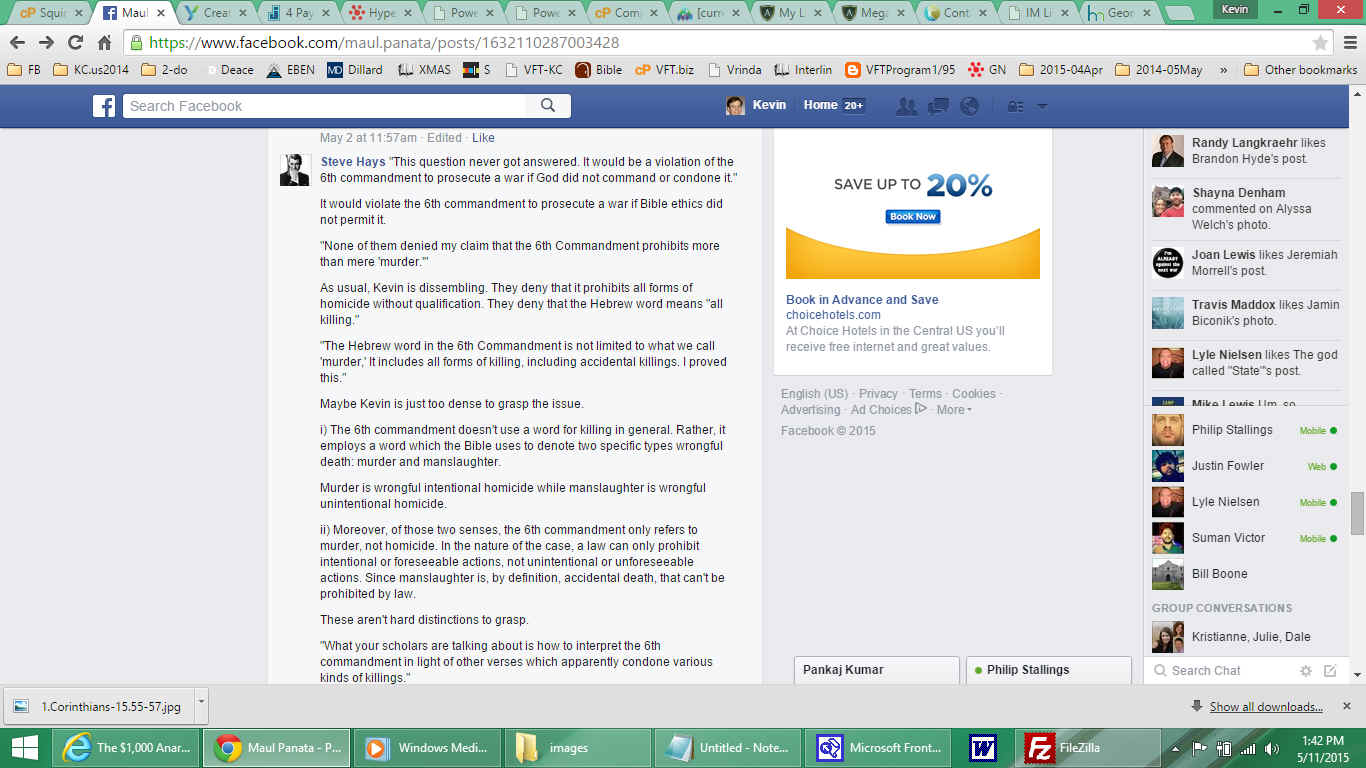
Previously:
| Last I weekend I was in charge of out-of-town hospitality, for those who attended my mother's funeral. That's my excuse for not replying sooner. | |
| Steve Hays | |
| "This question never got answered. It would be a violation of the 6th commandment to prosecute a war if God did not command or condone it." | |
| It would violate the 6th commandment to prosecute a war if Bible ethics did not permit it. | Question-begging. Where does the Bible permit war if "war" in the Bible is actually ceremonial?
But you've now conceded the point I was making, which is that unauthorized war violates the 6th Commandment, which DOES prohibit unauthorized war. |
| "None of them denied my claim that the 6th Commandment prohibits more than mere 'murder.'" | |
| As usual, Kevin is dissembling. | To "dissemble" is to "conceal one's true motives, feelings, or beliefs. In what way am I "dissembling?" What am I hiding? Or is this just another reckless and unnecessary personal attack? |
| They deny that it prohibits all forms of homicide without qualification. They deny that the Hebrew word means "all killing." | Excuse me. I didn't mean they never "denied" my claim. I meant they never refuted my claim. |
| "The Hebrew word in the 6th Commandment is not limited to what we call 'murder,' It includes all forms of killing, including accidental killings. I proved this." | |
| Maybe Kevin is just too dense to grasp the issue. | Why all the insults? |
| i) The 6th commandment doesn't use a word for killing in general. Rather, it employs a word which the Bible uses to denote two specific types wrongful death: murder and manslaughter. | Actually, it employs a word which is used to denote two specific types of wrongful death: intentional and unintentional. Which pretty much covers it all. |
| Murder is wrongful intentional homicide while manslaughter is wrongful unintentional homicide. | Why do you say manslaughter is "wrongful" homicide? In your next paragraph you (wrongly) say manslaughter is not prohibited. |
| ii) Moreover, of those two senses, the 6th commandment only refers to murder, not homicide. In the nature of the case, a law can only prohibit intentional or foreseeable actions, not unintentional or unforeseeable actions. Since manslaughter is, by definition, accidental death, that can't be prohibited by law. | The word in the 6th Commandment is used to describe unintentional homicide, as I have proven by citing the relevant passages. When a man committed an accidental killing, he had to flee to the city of refuge, or else the avenger would shed his blood. The killer had to stay in the city until the death of the high priest. I would say the law "prohibits" something that could be avenged. If a child starts throwing knives around the house and the parent says "You're going to kill someone!" that is a prohibition, an imperative, even though it takes the form of a declarative. An obedient child stops doing that. Although the homicide in Numbers 35 or Deuteronomy 4:42 might be accidental, life is precious enough that everyone has a moral obligation to check one's ax to make sure it is safe and isn't going to fly off the handle, so as to prevent an unintentional manslaughter. |
| These aren't hard distinctions to grasp. | More personal insult substituted for facts. |
| "What your scholars are talking about is how to interpret the 6th commandment in light of other verses which apparently condone various kinds of killings." | |
| No, they're also talking about what the Hebrew word (rasah) means in Pentateuchal usage. | Then they are wrong, as I've proven. I was just giving them the benefit of the doubt. |
| "I have argued that what you call a 'judicial' 'homicide' is a "ceremonial" and priestly function, not a 'civil' function." | |
| That's what you've repeatedly asserted. | And you've repeatedly failed to refute. |
| "The Bible describes the burning of Jericho (and other similar acts) as turning the city into a whole burnt offering, again to cleanse the Promised Land of so-called 'capital' crimes, violations of God's Law by the pagan Gentile inhabitants (see Leviticus 18:24-30)." | |
| Kevin only has two buttons: rewind and replay. He never advances his argument in the face of counterarguments. | If you have an answer to my argument, why not cut-and-paste it instead of merely insulting me? |
| Notice that he's appealing to distinctives of the Mosaic covenant. But the Noahic covenant didn't have the same distinctives. | Mere assertion. Nothing to back up the claim.
Now we have, once again, the naked claim that they are different. But where does the Bible exhibit these differences? Unless you're a dispensationalist, you should assume covenantal continuity, and easily find the Bible laying out the newness of the latest covenant, that is, those points where the covenants differ. On this point, there is continuity between the covenants. Both Moses and Noah were commanded to shed the blood of "capital" criminals. |
| "Silly question" | |
| It's only silly to Kevin because he's too obtuse to consider the implications of his position. The Mosaic covenant was temporary. When he reinterprets the Noahic covenant in light of the Mosaic covenant, he implicitly makes that temporary, too. | The burnt offerings of the Noahic covenant are not temporary? I've seen no Biblical evidence that the blood shedding required of Noah is theologically different from the blood shedding required of Moses. Just a papal pronouncement that we are all supposed to accept on blind faith.
Despite differences in covenantal administration, all Old Testament covenants were united on the need to shed blood for atonement. |
| The fact that Genesis foreshadows later developments doesn't begin to entail that you can reverse that progression. | How about some Biblical evidence to support your claim? Otherwise, this is just an "ex cathedra" pronouncement. |
| "There is no essential difference in the acts of shedding blood which we find in Genesis 9 and Numbers 35. They serve the same covenantal purpose under the Old Covenant, and are superceded in the New Covenant." | |
| Which begs the question. | At least I cite some verses. Your question-begging is just a authoritative-sounding pronouncement. |
| I said, "Holy war presupposes sacred space. Holy land. Israel's cultic holiness." | |
| To which Kevin responds: "This is a bumper sticker, not an argument." | |
| It's ironic that someone who makes such a big deal about the ceremonial law and ritual purity is monumentally ignorant concerning the unique cultic holiness of ancient Eretz Israel. | Why not just prove your point instead of relying solely on personal insults? |
| It's even worse when he keeps citing passages like Num 34, but he's too dim to register what that says. | Almost every line has an insult. Truly Clinical. |
| "33 You shall not pollute the land in which you live, for blood pollutes the land, and no atonement can be made for the land for the blood that is shed in it, except by the blood of the one who shed it. 34 You shall not defile the land in which you live, in the midst of which I dwell, for I the Lord dwell in the midst of the people of Israel.” | |
| Murder pollutes the land because the land is sacred. | "Non-sacred" land is not polluted by murder? "Neutral" land is not polluted by murder? Can you prove this counter-intuitive claim from Scripture? |
| And the land is sacred because God dwells in the land of Israel. That alludes to the tabernacle, which took up permanent residence in Eretz Israel. Moreover, the tabernacle was sometimes filled or overshadowed by the Shekinah. | God doesn't dwell with us anymore? There's no temple on earth?
Jesus said, "I am with you always." Under the New Covenant, All the world is more sacred than Israel was in the Old Covenant. But either way, after Christ shed His blood, no other blood should be shed. And the only commands which can plausibly be used to justify violating the 6th Commandment ("capital punishment") are commands to shed blood. |
| The ground is consecrated by contact with the tabernacle. Unless the land was sacred to begin with, murder wouldn't desecrate the land–requiring subsequent purification. It's God's presence in Eretz Israel that makes it holy land. And that stands in contrast to God's absence elsewhere. That linkage is unique in time and space. | Israel is not more sacred than any land today. Israel is not more sacred than Mount Ararat, where God told Noah to shed blood. Israel is not more sacred than the land east of Eden, where Abel's blood cried from the ground.
But even if land in contact with the Tabernacle in the Old Testament was more sacred than land in contact with the Body of Christ in the New Covenant, there's no Biblical evidence that blood had to be shed only in sacred land, but not in profane land. Deuteronomy 21 says that if someone is murdered in the non-eretz land between cities, blood must be shed to make atonement. I don't see any theological difference between Deut 21 and Numbers 35. Same theology of blood for atonement. No blood shedding is efficacious under the New Covenant -- except the blood of Christ. On all land everywhere in the world. |
| "By this logic, any departure from God's Law can be justified as a 'practical' response to living in 'a fallen world.'" | |
| i) I didn't argue for a "departure from God's law." | Question-begging. God's Law says "Thou shalt not kill." You justified departures from this command using Old Covenant verses requiring the ritual shedding of blood. I argued that these rituals are inappropriate under the New Covenant, and so "Thou shalt not kill" is the rule from which we should not depart. |
| ii) Moreover, if Kevin thinks that all the Mosaic laws were essentially ceremonial, then he repudiates the Ten Commandments in toto under the new covenant. | How so? "Thou shalt not kill" is not "ceremonial." "Shed blood to make atonement" is. |
| "Genesis 9 is about blood." | |
| Actually, Gen 9 is about murder, using "blood" as a metaphor for murder. | "Blood" is a metaphor for life.
|
| "'Recasting' Genesis 9??? READ THE VERSES!" | |
| i) That's a good illustration of someone who's oblivious to his presuppositions. Kevin said "the ritual shedding of blood in these verses (Deut 21/Num35/Gen9)." He has "ritual" etched on his glasses, so everywhere he looks he sees "ritual." | |
| But of course, nowhere in Gen 9:4-6 is there any reference to the "ritual" shedding of blood. | All intentional acts of shedding blood which are not criminal (that is, acts of shedding blood which are authorized by God) are "ritual" acts, as opposed to "criminal" acts. |
| ii) Furthermore, his ritualistic gloss on Gen 9 is nonsensical. Gen 9 is a case of poetic justice. Because the murderer shed innocent blood, his own blood will be shed. | All termination of life is the shedding of "innocent blood," because "the life is in the blood." (I've already posted the references to this.) It is equivalent to "innocent life." They are acts of blood shedding to make atonement. |
| But by Kevin's logic, if "bloodshed" is shorthand for "ritual bloodshed," then every murder is ritual murder. On that interpretation, every murder is a "ceremonial and priestly function." | Ha ha. Qualifies as cynical humor, but not good theology. This is like the line I called a "silly question." |
| "I think I've presented a 'prima facie' case that the ritual blood shed in cases of unsolved homicide (Deut. 21) is of the same character as the blood shedding in Numbers 35:33, which is of the same covenantal character as the blood shedding in Genesis 9." | |
| Three glaring problems which Kevin is too blinkered to discern: | Steve is incapable of saying anything at all without an insult. It is distinctively un-pastoral. |
| i) There's the blatant equivocation. Deut 21 refers to shedding animal blood to purify the land. That's hardly equivalent to shedding human blood. | It is theologically equivalent, because the animal is a substitute for the unconvicted murderer. |
| ii) The passage explicitly refers to the the guilt of "innocent" blood (vv8-9). So it's not talking about homicide in general, but wrongful death in particular. | By your own logic, all murder is the shedding of blood which did not deserve to be shed, i.e., was not authorized by God to be shed. |
| iii) The land can only be defiled due to the special character of the land. Not land in general. Not anywhere or any place. Rather: | In case you missed my argument above, here it is again:
Deuteronomy 21 says that if someone is murdered in the non-eretz land between cities, blood must be shed to make atonement. I don't see any theological difference between Deut 21 and Numbers 35. Same theology of blood for atonement. The unique holiness of some parcels of land as compared with other parcels of land which are less holy is not the issue. The issue is a theology of blood for atonement. This is the distinctive feature of the Old Covenant, and this ritual shedding of blood does not operate under the New Covenant. There are therefore no exceptions to the 6th Commandment, "Thou shalt not kill." |
| "If in the land that the Lord your God is giving you to possess someone is found slain…" (v1). | "land" in this verse is 'ădâmâh, not 'erets. |
| "You shall not defile your land that the Lord your God is giving you for an inheritance "(v23). | "land" in this verse is 'ădâmâh, not 'erets.
This is objectively not good "scholarship." Your argument is doomed. |
| The unrepeatable sanctity of Eretz Israel is necessary precondition for blood guilt polluting the land. | You've never proven this point from Scripture.
But even if you're right, and only erets-murders required blood atonement, can you please cite the verses which authorize "capital punishment" in our day if no blood is any longer to be shed, since all "capital punishment" prooftexts are actually commanding blood atonement for erets-murders? No, you can't. Despite all your personal insults, I think I'm a reasonable person, and you've certainly failed to persuade me with this last line of argument. It utterly fails. |
Previously:
| In this age of the Internet, everybody has a chance to spout off their opinion.
A Christian should think of these opportunities as moments of teaching, and a labor of word and doctrine. 1 Timothy 5:17
Let the elders who rule well be counted worthy of double honor, especially those who labor in the word and doctrine.
Even if we are not "clergy," we should look at our personal character whenever we post on Facebook or comment on a blog, to make sure we are the kind of person who does the best job possible of articulating the truth. Here's how the Bible describes such people: |
|
Not given to wine, no striker, not greedy of filthy lucre; but patient, not
a brawler, not covetous;
For a bishop must be blameless, as the steward of God; not
self-willed, not soon angry, not given to wine, no striker, not given
to filthy lucre;
The Greek word behind the KJV word "striker" is
We see this character defect in nearly every sentence Steve writes. He has to "strike a blow" with a pugnacious personal insult. Facts are never enough. Scholarship must be peppered with personal attack. |



